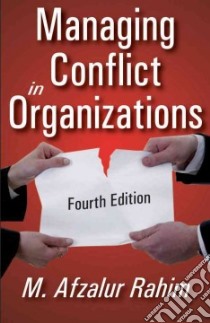Managing Conflict in Organizations - 9781412814560
Un libro in lingua di Rahim M. Afzalur edito da Transaction Pub, 2010
- € 102.90
- Il prezzo è variabile in funzione del cambio della valuta d’origine
Conflict is inevitable among humans. It is a natural outcome of human interaction that begins when two or more social entities engage one another while striving to attain their objectives. Relationships among people or organizations become incompatible or inconsistent when two or more of them desire a similar resource that is in short supply; when they do not share behavioral preferences regarding their joint action; or when they have different attitudes, values, beliefs, and skills.
The theme of conflict has been with us and has influenced our thinking from ancient time. It has received different degrees of emphasis from social and biological scientists during various periods of history. Over the years phenomena relating to conflict have been investigated by economists, historians, novelists, philosophers, political scientists, sociologists, psychologists, and theologians. Scholars in organization theory became interested in scientific investigation of conflict during the later part of the last century. There has been renewed interest and significant changes in the study of conflict in social and organizational contexts since then.
After much debate, organizational conflict is now considered legitimate and inevitable; it may even be a positive indicator of effective organizational management. It is now recognized that within certain limits, conflict is essential to productivity. Conflict may result in creative solutions to problems or lead to achievement of subsystem or larger organizational objectives that otherwise would not have been possible. Little or no conflict in organizations may lead to stagnation, poor decisions, and ineffectiveness. This is a vigorous analysis of the rational application of conflict theory in organizational life.
Informazioni bibliografiche
- Titolo del Libro in lingua: Managing Conflict in Organizations
- Lingua: English
- Autore: Rahim M. Afzalur
- Editore: Transaction Pub
- Collana: Transaction Pub (Hardcover)
- Data di Pubblicazione: 31 Ottobre '10
- Genere: BUSINESS and ECONOMICS
- Argomento: Conflict management
- Pagine: 299
- ISBN-10: 1412814561
- EAN-13: 9781412814560


